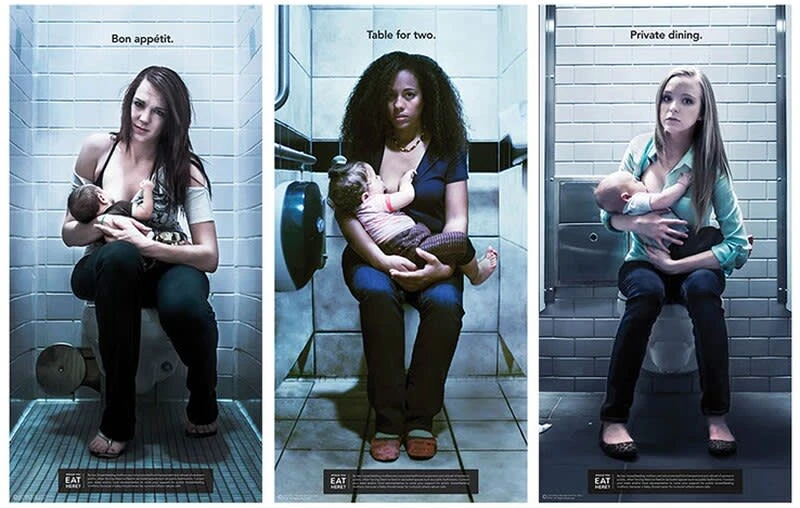Breastfeeding in Public
Why is breastfeeding in public a controversy? Do my breasts exist only to please you? Breastfeeding is a very natural part of motherhood and although not every person chooses to breastfeed, nor is every person who breastfeeds a woman. Still it has people up in arms about how and when we should see it. Let's take a look into the history of breastfeeding. Breastfeeding historically is a job royalty and wealthy people do not engage in. Instead they have servants and peasants become wet nurses. There are a few reasons for this, one being that men felt as though it ruined their wives' breasts and took their affection away from them. They also believed it made women less fertile and therefore less likely to give them heirs. Having a wet nurse was also a symbol of wealth and status, that you could pay to have another woman do the labor of feeding and caring for their child. We can see that from the beginning feeding one's child is not only intertwined with classism but also the male gaze.
Wet nursing was a huge way to exploit motherhood in slavery. Wet nurses could only be women who had babies of their own, so slave owners would use those women to nurse their babies. Instead of paying a woman to wet nurse, they would just enforce wet nursing on their slaves, commodifying these women's motherhood to nurse babies that aren't theirs. They would separate black mothers from their children, therefore creating and perpetuating this stereotype of black mothers either leaving or not caring for their own children. This would obviously take a huge psychological toll on the enslaved women, being forced to care and feed children that are not their own without choice. Their children go hungry, with the only possibility of seeing them is if they are allowed into the yard and happen to pass by their child. They also used breastfeeding as a form of birth control for enslaved women, because breastfeeding can act as a natural birth control. At least for the first six months after childbirth, your body can stop ovulating, therefore not being able to get pregnant. Another way to keep black women under control of their masters in every way possible, down to their fertility.
Although there is no national law surrounding breastfeeding in public, every state has some type of law in place in support of breastfeeding in public or providing a private space for women to nurse. 31 states have also exempt breastfeeding from public indecency law. There is no reason legally why women shouldn't be able to breastfeed in public. The real problem is the way people look at women, whether that's other women struggling with internalized misogyny, or men objectifying the feeding mothers. Right now mothers have to decide which uncomfortable place they want to be in, an awful location such as a bathroom, or sit comfortably and run the risk that people may ostracize you for it.
Should women go sit on the unsanitary toilet to feed her child to make you more comfortable? The “When Nurture Calls” campaign tackles this question with these posters showing exactly what some people are suggesting. Would you eat your meal in this disgusting bathroom? Why is our society focused on making these things so much harder for women? Women's breasts sole purpose was to feed their children, but that's not how you want to look at them. Monica Young, the creator of this campaign, talks about how more than anything she's gotten sexual remarks during nursing. Breastfeeding is about nurturing your child, and yet we are still objectifying women who are trying to take care of their baby and asking them to hide instead of challenging why people are seeing them in a sexual light.

Women's bodies have been objectified so much we forget the reason breasts exist. Boobs have become an object of desire and lust that when someone uses it for its natural purpose they can be the subject of harassment, judgment, or objectification. Even other women take issue with some people breastfeeding. We can see this as generational trauma and internalized misogyny caused by society's opinions on women's bodies and how we've seen breastfeeding over time. Women who have been scrutinized or taught to not breastfeed in public because of the male gaze are trying to pass down those beliefs and trauma to the next generation of women, therefore continuing the cycle. Using your body for anything besides sex is seen as resistance to the sex culture, although that can be true, it can also just be a mother trying to feed her baby without making a political statement.
Why not just use a cover? That's what people tend to counter with when the topic of public breastfeeding is brought up. But the real question should be, why do they need to? Our society is not trying to comfort and make life easier for mothers. Instead we want to tend to our own discomforts of seeing them. We'd rather tell them to hide than confront why we take issue with seeing them, and recognize that our opinions of breasts may be outdated. Now that we see and understand the history of breastfeeding, it's clear how sexism and classism are a huge part of it. We need to unravel the thread of our beliefs, and ask if these are our own feelings, or something that has been ingrained in us through misogyny and racism.
Like this project
Posted Jul 27, 2023
This is a blog post for a feminist blog about the implications and controversy about breastfeeding in public.
Likes
0
Views
3





